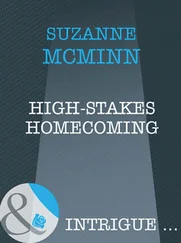Letting out a breath, she turned the key. The tractor motor turned over, coughed then caught, the rumble loud enough to preclude conversation.
Relief loosened off the tension in the pit of her stomach. Gunshot wound or not, Carter was on his own. If he wanted female company, there were plenty of women in town who would be only too pleased to soothe his hurts and massage his sore muscles; women who were younger, prettier and a whole lot more fun than she ever planned on being.
She released the clutch. “There is a rule,” she just had to keep reminding herself. “Three strikes, and you’re out.”
Carter watched the retreating dust cloud, eased his leg into a more comfortable position and slammed his door closed.
The message screen of his cell phone glowed. Two missed calls and a message. The missed calls were both from his mother. Ever since he’d gotten back into the country both of his parents, who had retired to a popular resort town further up the coast a couple of years ago, had kept in daily contact. The fact that he had been taken prisoner had shaken them. The gunshot wound came a close second, but not by much. Despite his assurances, they insisted on keeping in close touch.
The text message was from Gabriel West, a longtime friend, ex–SAS sniper and leader of the private team that had flown into Borneo to rescue him.
Carter read the message and pressed Delete. Lately West had been abnormally solicitous and curious about what he was up to—and with whom. Along with everything else that had gone wrong lately, Carter was beginning to feel like he was being watched over by an overlarge hen.
Turning the key in the ignition, he manoeuvred the truck off the verge and into the entrance of his drive, barely noticing the weed-infested borders, or the fact that one of the smaller farm sheds had lost its roof in the last big storm.
He had to wonder just what he’d let slip when he’d been semi-conscious in the hospital. West was more than curious. Now he wanted to visit.
It was a fact that he did feel different. He still hadn’t figured out exactly what had changed except that for months he’d felt unsettled—in the psychologist’s jargon, “disengaged.” Even when he’d finally been declared fit enough to resume light duties—translate that as pushing paper in an office—he’d felt like a square peg trying to fit into a round hole. The psychologist had diagnosed post-traumatic shock syndrome—maybe even an early mid-life crisis.
Carter frowned as he slowed for a bend. He liked things cut-and-dried, the idea that he was suffering from something as woolly and amorphous as some kind of mental and emotional breakdown ticked him off.
It was a fact that the months spent in captivity hadn’t been a picnic. From beginning to end, what had happened had been a prime example of bad timing and bad luck.
The assignment to escort an Indonesian government official to the small village of Tengai hadn’t been high-risk, or even particularly interesting. Carter had simply been in the wrong place at the wrong time. Two rival rebel factions had chosen that particular village to clash. When the shooting started, Carter had kept to task and protected the official, but when they had finally made it out of the building, their transport and backup were gone.
If they’d stayed inside and kept out of sight, in all probability they would have been in the clear, but one of the village children had been cut up by a ricochet and Carter had started to treat him. Two of the rebels who were still holed up in the village had accosted Carter at gunpoint, ignored the government official and demanded Carter leave with them.
They didn’t want to kidnap a bureaucrat. What they needed was a trained medic.
After stripping the official of his suit, his watch and all of his cash, the men had herded Carter into the jungle, his weaponry, communications equipment and medical kit confiscated along with his boots.
Apart from the restricted diet—crazily enough, stolen army rations—and the hours spent kicking his heels under armed guard, nothing horrific had happened. He had been too useful. He’d treated two of the rebels for gunshot wounds, delivered a baby and dealt with a minor outbreak of dysentery. When he’d finally managed to slip away at night, four months after capture, all he’d had were his clothes, a knife he’d managed to steal and the remnants of his medical kit.
Without a compass—and travelling beneath a canopy that blocked both the sun and stars, burying him in either a soupy half light or impenetrable darkness—he had ended up travelling in a circle and had practically walked back into the rebel camp. A sentry had spotted him and fired, but the fact that he’d been hit at all was a miracle, and the sentry himself didn’t register the hit. The rebels as a force were canny and elusive, but they weren’t trained soldiers. They relied on surprise and the threat of their weapons—not accuracy.
A brief search was conducted, then abandoned, and Carter was able to put some distance between himself and the camp. After that, things had gotten a little hazy. He’d injected himself with morphine, lain up for a day, strapped his leg with his shirt then started to walk. The next day he’d found a small settlement and managed to get some food and water. With the help of the village midwife he’d extracted the bullet then had spent the next three days on his back in a small tin shack fighting off a fever.
With his leg heavily bandaged and seeping, Carter had been escorted by one of the villagers to the next village further down the valley, on the verge of the Kalimantan Lowlands. It was there he’d gotten the news that a private team was looking for him—not the army rescue squad he’d expected.
Apparently, after political pressure exerted by the government official who had been left kicking his heels in Tengai, the peacekeeping unit had been forced to withdraw from Borneo. The irony that the official he had been commissioned to protect from the rebels had left him hanging out to dry wasn’t lost on Carter. Lately, with his luck, crossing the road had become dangerous.
Carter brought the truck to a halt in front of the sprawling, one-storied house, perched on a bluff above the bay. The house, which he’d bought from his parents along with the farm, was old and comfortable, hemmed by verandas and large sweeping lawns. A cooling breeze rustled through a clump of oleanders, the scent of the jasmine that grew wild in the garden filled his nostrils and over all was the fresh tang of the ocean. From where he was sitting, he could see the water, a broad sweep of blue stretching to the horizon.
Grabbing his suitcase from the back seat of the truck, he limped toward the porch, slid the key in the lock and pushed the door wide. The late-afternoon sun sent his shadow sliding over the faded hall carpet. The house was silent and deserted.
Stepping inside, he set the suitcase down and limped through to the empty kitchen, checking that the hot water was on. The couple he employed to mow the lawns and clean the house had been in. His gaze swept the clean lines of the kitchen counter and snagged on the blinking light of the answering machine. With resignation, he picked up the receiver and hit the play button.
One hang-up, two messages from an old girlfriend, Mia, wanting to know how he was after his “accident,” and a call from his C.O. wanting to set up an appointment for his next round of assessments.
Carter hit the delete button. Six weeks after being airlifted to a hospital in Darwin, Australia, he’d been put on a routine flight into Auckland and had reported to his C.O.
The debrief hadn’t been pleasant. Naturally, he had failed his medical exam. His psychological report had been even worse. His commander had been impressed by the fact that he would be able to walk without the aid of a stick, eventually, but the prognosis for resuming active service was grim.
Читать дальше












